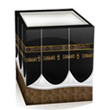The Imamate of one opposed to Ahlus-Sunnah
- Details
- Category: Sheikh Bin Baz
- Published on Thursday, 07 November 2013 10:55
- Hits: 890
The Imamate of one opposed to Ahlus-Sunnah
Question:
Is it permissible to pray behind a person whose beliefs are opposed to those of Ahlus-Sunnah wal jama'ah, such as an Ash'ari, for example?
Answer:
The best answer - and Allaah knows best - is that it is permissible to pray behind anyone who is judged to be a Muslim and it is prohibited to pray behind anyone who is not judged to be so. This is the saying of a number of the scholars, and it is the most correct. As for those that say that the prayer is not accepted behind a sinner, his saying is rejected. The evidence for this is that the Prophet Salallaahu alayhi wasallam allowed prayer behind rulers, and among rulers are many who are sinners, ibn 'Umar, Anas, may Allaah be pleased with them, and others prayed behind Al-Hajjaj, who was the most unjust of men. In short, prayer behind any innovator who is not outside the fold of Islaam is accepted, as is prayer behind an open sinner, so long as his sins do not remove him from the fold of Islaam. However, it is incumbent that a person from Ahlus Sunnah be appointed if they are able to join together and put forward the best of them.
Shaykh `Abdul-`Azeez Bin Baz
Fatawa Islamiyah, vol.1, p.158, DARUSSALAM





















